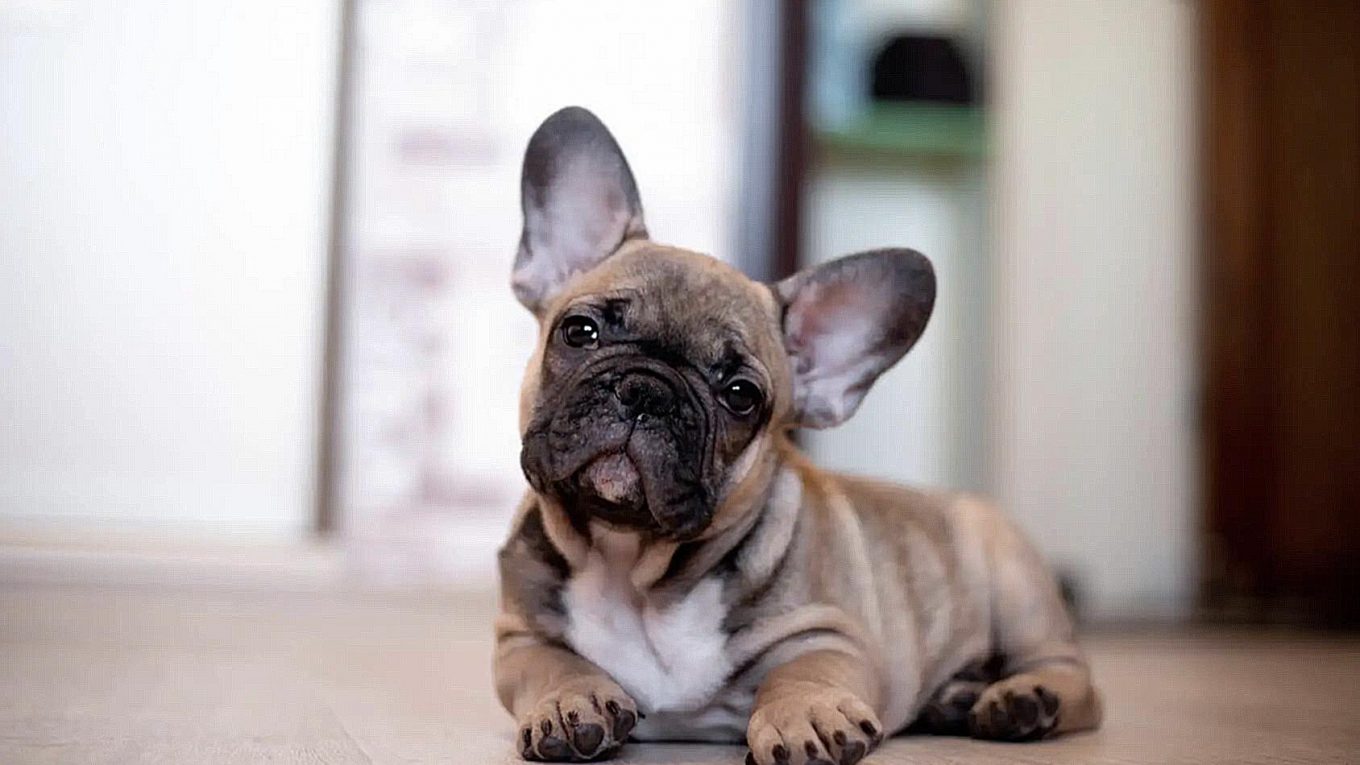Are French Bulldogs good with big dogs?
When it comes to dogs, the heart knows no boundaries. And that includes our little buddies, the French Bulldogs, who are known for their compact frames and adorable squishy faces. Believe it or not, these pint-sized pups can often form incredible bonds with larger dog breeds. It’s a match made in doggy heaven. But before we dive into this unexpected friendship, let’s explore what makes it work.
In this blog post, we’re going on an adventure through the enchanting world of French Bulldogs and their compatibility with big dogs. We’ll unravel the unique dynamics at play, debunk some common myths along the way, and arm you with insights to make this companionship a success. So whether you’re a proud owner of a French Bulldog contemplating adding a giant furball to the mix or simply curious about these unlikely friendships, get ready for some eye-opening information that will leave you wagging your tail.
So grab yourself a steaming cup of joe, get comfy in your favorite spot, and let’s embark on this thrilling journey into the wild world of canine connections where size is just a number.
Understanding the Temperament of French Bulldogs
Contents
- 1 Understanding the Temperament of French Bulldogs
- 2 Supervising Interactions between French Bulldogs and Big Dogs
- 3 Introducing a French Bulldog to a Big Dog in a Neutral Environment
- 4 Establishing Positive Relationships between French Bulldogs and Big Dogs
- 5 The Importance of Early Socialization for French Bulldogs
- 6 Monitoring Behavior During Playtime Between a French Bulldog and a Big Dog
- 7 Training to Manage Interactions between a French Bulldog and a Big Dog
- 8 Individual Personality Traits of French Bulldogs
- 9 Conclusion
French Bulldogs are beloved companions known for their friendly and affectionate nature. If you’re considering introducing your French Bulldog to a larger dog, it’s crucial to approach the process with care and patience. In this article, we’ll explore the temperament of French Bulldogs, provide insights on their compatibility with big dogs, and offer step-by-step guidance on introducing them. With proper socialization and guidance, you can foster a positive relationship between your French Bulldog and a larger canine companion.
Understanding French Bulldog Temperament:
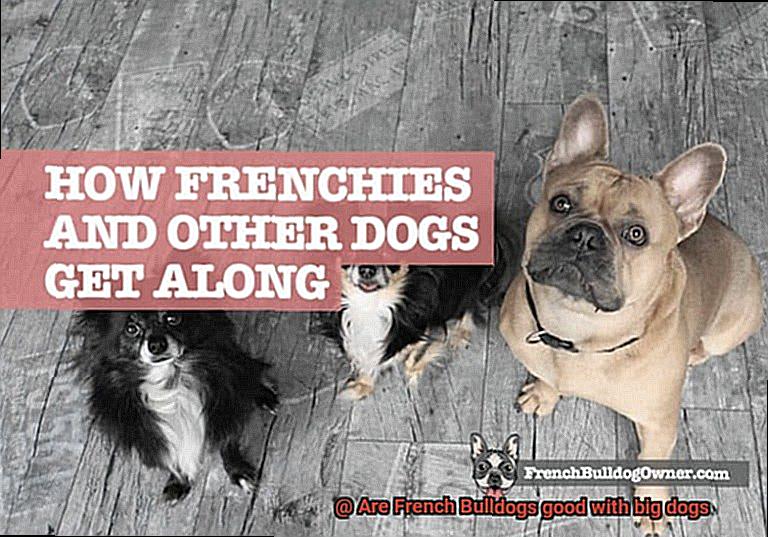
French Bulldogs are sociable, playful, and loving creatures, making them great family pets. They possess an adaptable nature that allows them to thrive in various living situations, including those with other dogs. While they are not inherently aggressive, they may exhibit protective behavior towards their owners and territory. Early socialization and training are paramount in shaping their interactions with other dogs.
Step-by-Step Guide to Introducing Your French Bulldog to a Big Dog:
Choose a neutral environment:
To ensure a successful introduction, select a neutral location such as a park or fenced backyard. This helps minimize territorial instincts and establishes a level playing field.
Observe body language:
During initial interactions, closely monitor the body language of both dogs. Look for signs of comfort, such as relaxed postures, wagging tails, and friendly play signals. If either dog displays signs of fear or aggression (like raised hackles or growling), separate them immediately.
Gradual introductions:
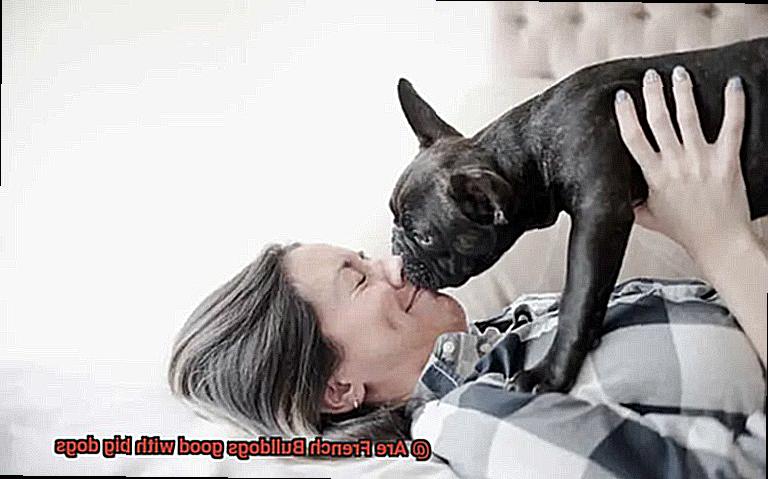
Start with brief interactions that gradually increase in duration over time. Allow the dogs to sniff and explore each other at their own pace while closely supervising their behavior.
Positive reinforcement:
Reward both dogs with treats and praise for calm and appropriate behavior during their meetings. This positive reinforcement helps create positive associations and reinforces desirable conduct.
Consistent training and boundaries:
Establish consistent training methods and boundaries for both dogs. Teach them basic commands like “leave it” or “come” to manage their interactions effectively. Reinforce these commands consistently to ensure better control during playtime.
Expose your French Bulldog to various sizes and breeds of dogs from an early age. This helps them develop good social skills and adaptability, increasing the likelihood of positive interactions with big dogs.
Supervise playtime:
While French Bulldogs are generally friendly, it’s essential to supervise their playtime with big dogs, especially due to size differences. Intervene immediately if any signs of discomfort or aggression arise and separate the dogs if necessary.
Seek professional guidance:
If you encounter difficulties during the introduction process, consider consulting a professional dog trainer or behaviorist. They can provide valuable insights tailored to your specific situation and help ensure a harmonious relationship between your French Bulldog and the larger dog.
Supervising Interactions between French Bulldogs and Big Dogs
Today, we’re diving into the importance of closely supervising interactions between our adorable Frenchies and their big dog counterparts. As much as we want our little buddies to make friends with all dogs, their small size can put them at risk during playtime. So, let’s explore some tips and tricks to ensure the safety and happiness of both our French Bulldogs and their big dog pals.
Controlled Environment is Key:
When introducing your French Bulldog to a big dog, it’s essential to do so in a controlled environment. Think neutral territory or a securely fenced area. This allows both dogs to feel comfortable and reduces the chances of any potential conflicts. Plus, it gives you peace of mind knowing they’re safe.
Watch That Body Language:
Keep an eagle eye on the body language of both dogs during their interactions. Growling, snarling, raised hackles, or stiff body posture are major red flags. If you spot any signs of aggression or discomfort, it’s time to intervene and separate the pups immediately.
Set Clear Boundaries:
Establishing clear boundaries and rules for both dogs is crucial. Positive reinforcement training is a fantastic way to achieve this. Rewarding good behavior lets them know what’s expected of them during playtime.
Keep it Short and Sweet:
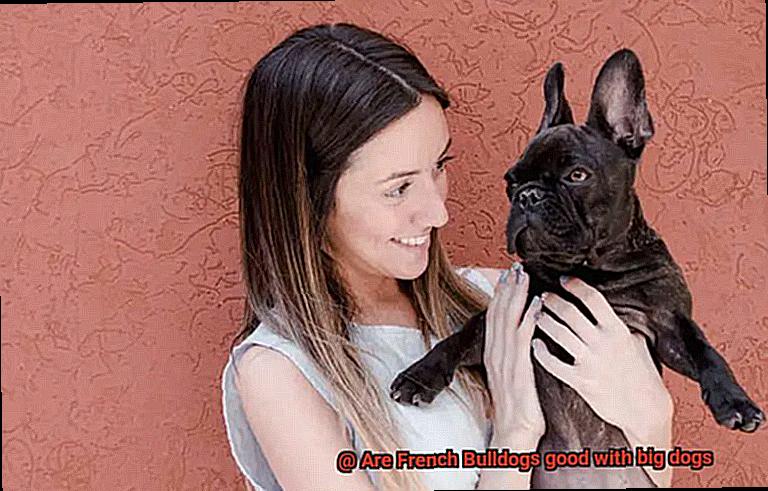
Play sessions between your French Bulldog and the big dog should be kept short and supervised. Overstimulation or exhaustion can lead to tension or even aggression. So, let them have their fun but be mindful of their energy levels.
No Alone Time:
Never leave your French Bulldog alone with a big dog, especially if they’re not familiar with each other. Even if they’ve had successful interactions in the past, it’s better to be safe than sorry.
Seek Professional Help:
If conflicts or problems arise during interactions, don’t hesitate to seek professional help from a qualified dog trainer or behaviorist. They’re the experts in handling these situations and can guide you towards a harmonious relationship between your furry friends.
Individual Differences Matter:
Remember, every dog is unique. Some French Bulldogs may get along swimmingly with big dogs, while others might be less comfortable. Assess each dog’s behavior and make decisions accordingly.
Safety First:
Always prioritize the safety and well-being of both your French Bulldog and the big dog. If you have concerns or the situation becomes unsafe, it’s better to separate them and find alternative ways for them to socialize.
Introducing a French Bulldog to a Big Dog in a Neutral Environment
Are you considering adding a big dog to your family, but already have a lovable French Bulldog at home? Introducing two dogs of different sizes and temperaments can be a challenging process, but with the right approach, it can lead to a harmonious relationship between your furry friends. As an expert on this topic, I want to share some key points to consider when introducing a French Bulldog to a big dog in a neutral environment.
- Choose a neutral territory: When introducing two dogs, it’s important to select a neutral environment where neither dog has established dominance or territorial behavior. This helps create a level playing field and reduces the chances of conflict. Consider meeting at a nearby park or a friend’s backyard.
- Start with leashed introductions: Begin the introduction by having both dogs on leashes. This allows you to maintain control and ensures the safety of both animals. Allow them to sniff and investigate each other while keeping the leashes loose. Remember, patience is key during this initial interaction.
- Observe their body language: Pay close attention to the body language of both dogs during the introduction. Signs of aggression or discomfort, such as raised hackles or growling, should not be ignored. If any signs of aggression are displayed, separate the dogs and seek professional help from a dog trainer or behaviorist.
- Positive reinforcement: Rewarding both dogs with treats and praise for calm and friendly behavior can help create positive associations during the introduction process. This positive reinforcement encourages them to view each other as potential playmates rather than threats.
- Gradual exposure: Over time, gradually increase the duration and frequency of their interactions in the neutral environment. If both dogs have shown positive behavior during leashed introductions, you can allow them to interact off-leash. However, always closely supervise their interactions and be ready to intervene if necessary.
- Separate spaces: While they are still getting acquainted, provide separate spaces for each dog in your home. This allows them to have their own safe haven and prevents any potential conflicts over resources.
- Supervision and patience: It’s crucial to supervise the dogs’ interactions until you are confident in their ability to coexist peacefully. This process may take weeks or even months, depending on the individual dogs’ personalities. Patience is key during this period, as forcing an immediate bond between the French Bulldog and the big dog can do more harm than good.
Remember, every dog is unique, and there is no guarantee that all French Bulldogs will get along with big dogs. Some French Bulldogs may be more compatible with smaller or similar-sized canine companions. It’s essential to assess each dog’s temperament and consult with professionals if needed to ensure a successful introduction and long-term compatibility between your French Bulldog and a big dog.
Establishing Positive Relationships between French Bulldogs and Big Dogs
When it comes to fostering positive relationships between French Bulldogs and big dogs, it is crucial to understand the importance of harmony and coexistence. A safe living environment, reduced stress levels for both dogs, and enhanced socialization opportunities are just a few of the benefits that arise from a positive relationship.
As an expert in this field, I have witnessed firsthand the transformative power of a well-balanced relationship between these two breeds.
In this blog post, I will share my expertise on how to establish positive relationships between French Bulldogs and big dogs, offering practical tips and insights to help owners create a harmonious environment for their furry companions.
Understanding Individual Temperaments:
The temperament of both French Bulldogs and big dogs plays a vital role in their ability to get along. While French Bulldogs are known for their friendly and sociable nature, big dogs can exhibit a range of temperaments. It is essential for owners to evaluate their own dog’s personality and adjust their approach accordingly. This understanding will facilitate effective communication and prevent any potential conflicts.
Gradual Introductions:
One key aspect of introducing French Bulldogs to big dogs is taking it slow. Begin by keeping both dogs on leashes during initial meetings, allowing them to sniff each other from a distance. Over time, decrease the distance between them over several supervised encounters until they are comfortable being in close proximity. This gradual exposure helps build trust and familiarity between the two breeds.
Neutral Territory:
Meeting on neutral ground, such as a park or a friend’s backyard, can greatly contribute to a positive introduction. By choosing a location where neither dog feels territorial, we can minimize any initial conflicts over territory and create a more neutral environment for them to interact.
Positive Reinforcement:
Positive reinforcement is key during interactions between French Bulldogs and big dogs. Owners should reward both dogs for calm behavior, such as sitting or staying relaxed when in each other’s presence. This approach helps establish positive associations and reinforces good behavior, fostering a sense of mutual respect and understanding.
Supervision:
Even if the initial interactions seem promising, constant supervision is essential. This ensures the safety of both dogs and allows for immediate intervention if any conflicts or misunderstandings arise. With proper supervision, owners can intervene promptly and redirect their dogs’ attention towards positive interactions.
Addressing Size Differences:
The significant size difference between French Bulldogs and big dogs should be acknowledged. It is important to provide separate spaces for each dog, such as designated sleeping areas or separate zones for eating. This ensures that both dogs feel safe and comfortable in their own space, minimizing potential conflicts related to resource guarding or territorial behavior.
The Importance of Early Socialization for French Bulldogs
French Bulldogs are known for their friendly and sociable nature, but early socialization plays a crucial role in ensuring that they get along well with other dogs, including big dogs. In this blog post, we will explore why early socialization is essential for French Bulldogs to develop positive relationships with big dogs.
Understanding Early Socialization:
Early socialization refers to the process of exposing French Bulldogs to various people, animals, environments, and experiences from a young age, typically between 3-14 weeks old. This period is considered critical as it helps shape their behavior and temperament in the long run. Socializing French Bulldogs with big dogs is particularly important because it helps prevent fear, aggression, and dominance issues that may arise when they encounter larger breeds later in life.
Benefits of Early Socialization:
- Comfort and Confidence: When French Bulldogs are properly socialized with big dogs, they learn to become comfortable and confident around them. They understand how to interact appropriately, communicate effectively, and establish boundaries in their interactions.
- Good Manners and Canine Etiquette: Early socialization also helps French Bulldogs develop good manners and proper canine etiquette, which are essential for harmonious relationships with other dogs. They learn how to greet, play, share resources, and resolve conflicts in a calm and respectful manner.
- Gradual Exposure: Socializing French Bulldogs with big dogs should be done gradually and under controlled circumstances to ensure their safety and positive experiences. It is recommended to start with well-behaved, friendly big dogs and gradually introduce them to bigger and more diverse groups of dogs.
Practical Tips for Early Socialization:
- Puppy Classes or Obedience Training: Puppy classes or obedience training programs that offer supervised play sessions with other dogs can be highly beneficial for the early socialization of French Bulldogs. These classes provide opportunities for them to interact with different breeds, sizes, ages, and temperaments of dogs in a controlled environment.
- Positive Reinforcement: Positive reinforcement techniques should be used during socialization sessions to encourage desired behaviors and create positive associations with big dogs. Rewards such as treats, praise, and play can help reinforce appropriate social behavior.
- Consistency is Key: Consistency is key when socializing French Bulldogs with big dogs. Regular exposure to other dogs throughout their lives is important to maintain their social skills and prevent regression or fear-based reactions.
Monitoring Behavior During Playtime Between a French Bulldog and a Big Dog
Playtime between a French Bulldog and a big dog can be a fun and enjoyable experience for both dogs. However, it is important to closely monitor their behavior to ensure their safety and well-being. Here are some key reasons why monitoring behavior during playtime is essential:
Preventing Aggression and Dominance
Big dogs may unintentionally intimidate or overpower French Bulldogs due to their size and strength. It is crucial to watch for any signs of aggression or dominance from either dog. This can include growling, snapping, or overly rough play. Intervening and redirecting their behavior is necessary to prevent any potential conflicts.
Balancing Play Styles and Energy Levels
French Bulldogs are known for their playful and energetic nature, but they may not be able to keep up with the high energy levels of big dogs. It is important to ensure that playtime is balanced and both dogs are engaged at their own pace. This can prevent frustration or exhaustion for the French Bulldog.
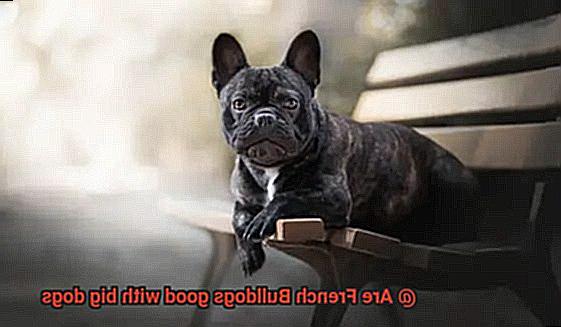
Providing a Safe Environment
Creating a safe and controlled environment for playtime is essential. This can include using a designated play area that is free from hazards or distractions. Using toys or objects that are suitable for both dogs’ sizes and strengths is also important to ensure fair play.
Incorporating Regular Breaks
Regular breaks should be incorporated into playtime to allow both dogs to rest and recharge. This helps prevent overexertion or fatigue, especially for the French Bulldog who may have limited stamina compared to bigger breeds.
Monitoring Body Language
Monitoring body language is crucial in assessing the dynamics between the French Bulldog and the big dog. Signs of fear, anxiety, or stress should not be ignored, as they can indicate that the playtime is not enjoyable or safe for one or both dogs. It is important to intervene and separate them if necessary to prevent any potential harm.
Training to Manage Interactions between a French Bulldog and a Big Dog
French Bulldogs are known for their friendly nature, but their small size can sometimes make them feel intimidated around larger dogs. Training them to manage their interactions with big dogs is essential to ensure their safety and well-being. In this blog post, we will explore effective strategies and techniques to help you train your French Bulldog to confidently navigate the dance floor with their larger counterparts.
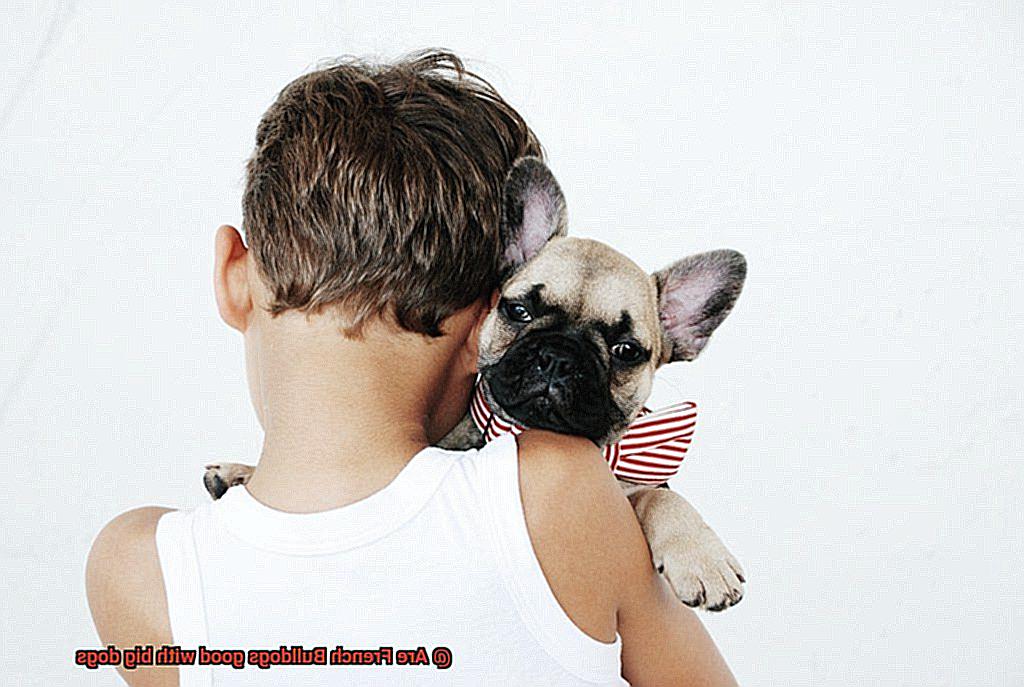
Socialization:
Start socializing your French Bulldog from a young age by exposing them to different types of dogs, including bigger breeds. Gradually introduce them to larger dogs in controlled and supervised environments. This helps them learn appropriate behavior and develop positive associations with bigger dogs.
Positive Reinforcement:
Use positive reinforcement techniques to reward your French Bulldog for calm and appropriate behavior around big dogs. Treats, praise, and affection should be given when they exhibit the desired behavior. Conversely, ignore or redirect their attention when they display fear or aggression to discourage such behaviors.
Leash Training:
Proper leash training is crucial for managing interactions between a French Bulldog and a big dog. Teach your French Bulldog to walk calmly on a leash, rewarding them for walking beside you without pulling or lunging towards other dogs. This will help you maintain control in potentially challenging situations.
Basic Obedience Commands:
Teach your French Bulldog basic obedience commands like “sit,” “stay,” and “leave it.” These commands are particularly useful when managing interactions with big dogs. They can help redirect your dog’s attention away from potential conflicts or prevent them from approaching larger dogs too quickly or aggressively.
Supervision:
Always supervise interactions between your French Bulldog and big dogs, even if they have been trained and socialized. Monitor their interactions closely to ensure both dogs are comfortable and safe. Intervene and separate the dogs if any signs of discomfort or aggression arise.
Gradual Exposure:
Gradually expose your French Bulldog to bigger dogs, starting with short, supervised interactions and gradually increasing the duration and complexity of the encounters. This allows your dog to build confidence and positive associations at their own pace.
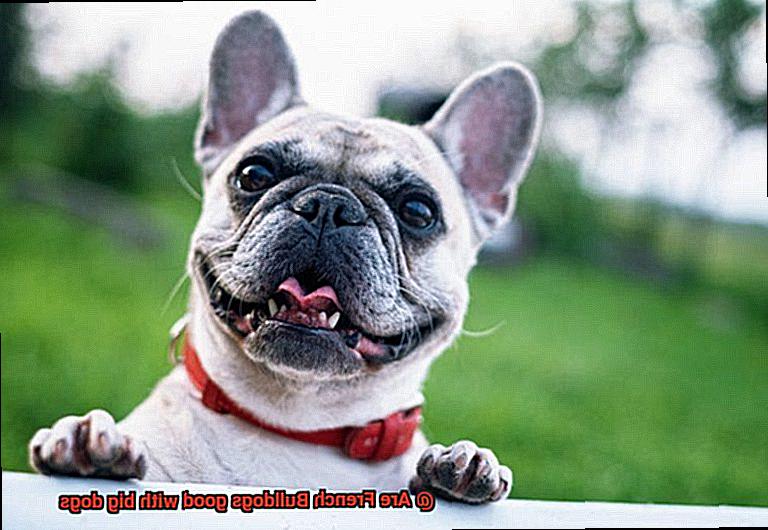
Seek Professional Help:
If you’re facing challenges in training your French Bulldog to manage interactions with big dogs, don’t hesitate to seek professional help from a dog trainer or behaviorist. They can provide expert guidance, tailored techniques, and ongoing support throughout the process.
Individual Personality Traits of French Bulldogs
If you’ve ever wondered whether your petite pooch can hold their own in the company of big dogs, you’re in for a treat. Get ready to discover the individual personality traits that make French Bulldogs naturals at dancing with the big dogs. So grab a cup of café au lait, sit back, and let’s dive into this pawsome topic.
Friendly and Sociable Nature:
French Bulldogs are as charming as a Parisian sunset. Their friendly and sociable nature makes them a top choice for doggy playdates. These little social butterflies enjoy spreading their love to both humans and canines alike. So when it comes to big dogs, they have no problem extending their paw in friendship.
Adaptability:
Just like a true Parisian, French Bulldogs embrace change with style and grace. Despite their small stature, these adaptable pooches can seamlessly adjust to any environment or situation. This adaptability extends to their interactions with big dogs, as they effortlessly navigate the dance floor of canine companionship.
Playful Demeanor:
Who says size matters on the dance floor? Certainly not our French Bulldog friends. Despite their petite frames, these little dynamos possess boundless energy and an infectious zest for life. Their playful demeanor allows them to engage in lively play sessions with big dogs. It’s like watching a synchronized canine ballet unfold before your eyes.
Intelligence and Willingness to Please:
French Bulldogs aren’t just pretty faces – they’ve got brains too. Their intelligence shines through as they quickly learn new tricks and commands. This intellectual prowess enables them to understand boundaries, making them excellent dance partners for big dogs. They’re eager to please their owners, which translates into harmonious interactions with larger canine companions.
f3XueAlb5Q4″ >
Conclusion
In conclusion, French Bulldogs can generally get along well with big dogs. Despite their small size, they have a big personality and are known for their friendly and sociable nature. They often enjoy the company of other dogs, regardless of their size.
However, it is important to note that every dog is an individual, and there can be exceptions to this generalization. Some French Bulldogs may not feel comfortable or may be intimidated by larger dogs. It is crucial to introduce them properly and monitor their interactions to ensure a positive experience for both dogs.
When introducing a French Bulldog to a big dog, it is recommended to do so in a neutral territory and under controlled circumstances. This allows both dogs to become familiar with each other’s scent and body language without feeling territorial or threatened.
Additionally, proper socialization from an early age plays a significant role in determining how well a French Bulldog will interact with big dogs. Early exposure to different sizes and breeds helps them develop good social skills and adaptability.
Training also plays a vital role in ensuring harmonious interactions between French Bulldogs and big dogs. Teaching commands such as “sit,” “stay,” and “leave it” can help establish boundaries and prevent any potential conflicts.
In summary, while French Bulldogs generally have a good temperament towards big dogs, individual personalities should always be considered.
